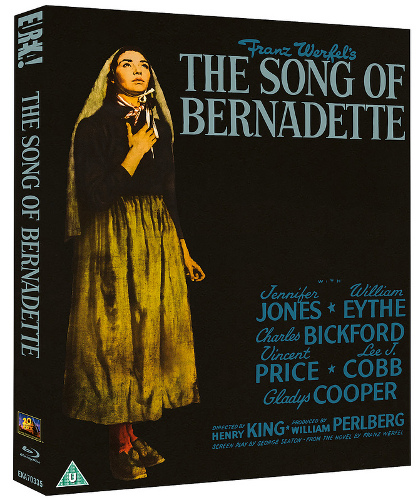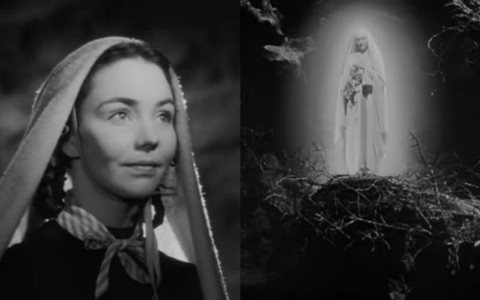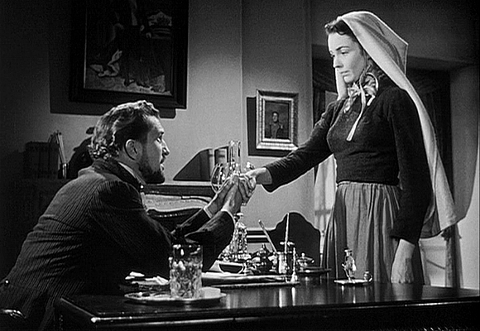The Song of Bernadette (1943)
Directed by: Henry King
Written by: Franz Werfel, George Seaton
Starring: Charles Bickford, Jennifer Jones, Lee J.Cobb, Vincent Price
USA
AVAILABLE ON BLU-RAY: NOW, from EUREKA ENTERTAINMENT
RUNNING TIME: 156 mins
REVEWED BY: Dr Lenera, Official HCF Critic
In 1858 Lourdes, France, Bernadette, an adolescent peasant girl, has a vision of “a beautiful lady” in the town dump. She never claims it to be anything other than this, but the townspeople all assume it to be the Virgin Mary. The pompous government officials think she is nuts, and do their best to suppress the girl and her followers, and the church wants nothing to do with the whole matter. But as Bernadette attracts wider and wider attention, the phenomenon overtakes everyone in the town, and transforms their lives….
I will admit that I approached Song Of Bernadette will some trepidation, and not primarily because I’m an Atheist. I’m actually more of a lapsed Catholic who doesn’t ‘believe’ and who despises organised religion, but who still admits that many of the beliefs of the world do have some worthwhile things to teach us and who is still able to admire, sometimes, pure faith. No, it was mainly because I’ve sat through a few of those horrible ‘faith’ films that sometimes even get cinema releases, all in the course of me being willing to undergo suffering so I can tell others not to of course. But I probably shouldn’t have been worried. After all, I do enjoy a lot of the old Biblical epics even if it’s often more for camp reasons [Cecil De Mille may have thought he’d made a genuinely religious film with Samson And Delilah but actually it’s a complete hoot and never pious and dull for a minute], while the 1959 Ben-Hur does have real emotional power – something that I can also say for Song Of Bernadette. Instead of wallowing in sentiment which is really a substitute for genuine reverence, it underplays things to give its subject some genuine dignity, and even manages some ambiguity and even-handedness, not totally committing itself until near the end where things went downhill a notch or too for me – but that was to be expected considering that it was made at the time when religion held considerable away over the movies, so much so that one of the things that the Production Code forbade in films was “ridicule of a member of the clergy”. For a major picture from 1943 dealing with religion though, it’s often surprisingly intelligent and even, dare I say, brave. Though hardly a film of action, spending much of its time on people trying to disprove or prove Bernadette’s visions and the miracles that result, it’s really engrossing throughout its two and a half hour running time.
It was based on a novel of the same title by Franz Werfel, which blended fact and fiction. George Seaton’s screenplay made some alterations, such as the government authorities being much more anti-religion than they actually were, Bernadette’s real-life friend Antoine Nicolau being deeply in love with her, and two characters being combined. When David O. Selznick heard of the production, he exerted his considerable influence to ensure his girlfriend Jennifer Jones got the lead part over Anne Baxter, Teresa Wright, Gene Tierney and Linda Darnell, the latter ultimately landing the role of the Virgin Mary.This incensed Werfel so much because of Darnell’s sexy reputation that he threatened to remove his name from the project. Producer Darryl F. Zanuck responded by telling Werfel that an unknown actress was chosen instead. Jones had made other films before this, but only under her real name, Phyllis Isley. In an effort to make the public believe that she was ‘discovered’ for this film, her screen credit reads “and introducing Jennifer Jones as Bernadette”. Fortunio Bonanova and Mona Maris were originally cast as Emporer Louis Napoleon and Empress Eugenie, but for some reason the scenes were discarded, and the scenes were re-filmed with Jerome Cowan and Patricia Morison. It was a big commercial and critical success and won four Academy Awards, though the Spanish release replaced much of the award-winning score by Alfred Newman. There were two radio adaptations in 1949 and 1954 from the Lux Radio Theatre, with Charles Bickford reprising his role as Dean Dominique Peyramale.
We do get some introductory text that I think may have been inserted late in the day, which in so many words basically tells us that if you’re a Christian you’re fine, but if you’re not then bugger off. It’s enough to put many people off, but thankfully matters certainly don’t continue in this vein. Things are really quite austere in feel as we’re introduced to Bernadette and her family. They have to live in the local prison, and employment and therefore money is scarce. When the father François Soubirous finds work, it’s to dump contaminated hospital waste. Bernadette is a meek, weak 14-year old with asthma, shamed in front of her Catholic school class for not having learnt her catechism well. Later that afternoon, on an errand with her sister Marie and school friend Jeanne to collect firewood outside the town of Lourdes, Bernadette sees her first vision of a lady standing in brilliant light, holding a pearl rosary. Almost immediately after, her parents get better jobs. Coincidence or not? As with all successive visions, nobody else sees what Bernadette sees, and we always see the vision from her viewpoint except for one rather out of place shot when she’s seen to kiss the lady’s foot. She now seems possessed of great energy and strength, and paddles in freezing cold water she claims is now warm. She tells her sister and friend, who promise not to tell anyone else. They do tell, however, and the story soon spreads all over town. Bernadette never mentions the Virgin Mary, but others do, and the authorities soon take an interest. Despite heavenly choirs on the soundtrack, we are not given a direct endorsement of these visions, and are clearly asked to consider that Bernadette could be deluded or just plain mad. Civil and church authorities question her, but most of these folk seem mostly concerned about politics, and for a while everyone just seems to pass the buck. It’s kind of amusing in a blackly comic way. Even the Catholic church is hardly portrayed as being sympathetic, which is rather daring for the time. Instead it’s an authoritarian bureaucracy which just thinks of itself and its image.
And the film goes even further. In Vital Dutour, Imperial Prosecutor, it goes so far as to present us with a ‘rational’ alternative, Dutour having chosen science and logic over faith and superstition. Bernadette is seemingly asked by the lady to drink and wash at a spring that doesn’t exist. She digs a hole in the ground and puts the wet sand and mud all over her. She’s mocked and led away, but later on the water begins to flow and exhibit miraculous healing properties. But, interestingly, none of the ‘miracles’, very few of which we actually see, are ones that can’t be explained away as fakery, and Dutour just thinks, as would many of us, that all this is just dangerous hysteria. He tries various methods to stop her, but never with malice, which is something that we can’t say for some of the others on her case who seem to enjoy what they’re doing. In a way, Dutour is almost as important a character as Bernadette, the film being also about his journey, though its predictable close is rather crass and cheap. Saying that, Vincent Price acts it very impressively, the camera remaining on his face for some time, and the part might still be one his best despite my undying love of many of his horror roles, while it’s possible that we’re being asked if religion is basically a question of human need, something pretty bold for the time really.
The lady finally identifies herself as ‘the Immaculate Conception’, which really annoys those in charge, though by now the area of the vision is a shrine visited by hundreds and the town is doing extremely well financially from it. It’s quite harsh watching the clearly increasingly weakened Bernadette repeatedly being questioned and examined, and even seeing the local Dean Dominique Peyramale, who was initially hostile to her, steer her towards her destiny when sometimes she seems to yearn for a ‘normal’ life. In fact, while the film does end up canonising Bernadette on screen, I’m not sure that it’s entirely celebrating of some things such as the the suffering aspect of Christianity [suffering=spiritual enlightenment] which to me is one of the religion’s most bizarre aspects [how can a religion have a torture device as its symbol?] – just think of the cold, jealous, mean Sister Vauzous who seems to have spent her life in pain serving God for nothing – though of course devout Christians will no doubt differ from me on what the film is trying to say. But the final scenes moved me greatly, partly because they actually hold back on the slush rather than piling it on. Bernadette’s final declaration of love is desperately sad, almost pitiful in its misguided-ness, but is it any more so than some declarations of more ‘earthly’ love in movies? One thing’s for sure, Jennifer Jones, usually a strong actress often miscast in parts, will break your heart in this film unless you lack one yourself. Her Oscar was entirely deserved. But then there’s a host of strong performances from the likes of Lee J. Cobb as the open minded Dr Dozous and Charles Bickford as Peyramale. Perhaps a slightly weak link is the Antoine Nicolau character who worships Bernadette in a different way to how she worships ‘the lady’. This subplot goes nowhere, but does tie in with one of the film’s major themes.
Igor Stravinsky was informally approached to write the music score before Fox stalwart Alfred Newman took over [Stravinsky later incorporated the material he’d written into the second movement of his Symphony in Three Movements]. I reckon some first-time viewers may find the strings, the choirs and the sheer amount of music a bit too much. In a way the music softens, sentimentalises the material. But taken as an example of Golden Age scoring with interweaving themes employed in the Wagnerian manner, it’s a shining example of its kind, and it does in a way take us inside Bernadette’s head. Newman’s ‘vision’ motif is almost divinely [sorry] beautiful. And in general I think The Song of Bernadette will surprise many with its balance and its restraint. There’s even a bit of witty commentary here and there which is still relevant, such as lines like:”If the church does nothing, we could sit back and sympathise – a wise attitude for any government “
The Song Of Bernadette truly looks like a film from 1943 given the best modern treatment on Eureka’s Blu-ray. By that, I mean that the image is very clear and detailed if not that sharp, looking totally celluloid rather than digital. There are a few small evidences of print damage, but they’re easy to miss. Eureka haven’t ported over the Jennifer Jones TV biography that was on the Fox DVD, or the isolated score and restoration comparison that was on the Twilight Time Region ‘A’ Blu-ray, but Eureka do offer a booklet which is probably of more value for collectors, while you still have the option of watching the film with the Overture which introduces the main musical themes and sets the mood. And the Twilight Time audio commentary packs so much in it would have made a ‘making of’ redundant. Unsurprisingly, it’s a very sober, respectful track, with the three participants not even talking to each other though it does seem like they were in the same room. Edward Z. Epstein focuses on Jones and the making of the film, Burlingame discusses the score, and Spoto, who I was keen to hear as I have a couple of books on Alfred Hitchcock by him, takes on the book and the religious side of things, explaining with clarity what it’s saying from the point of view of a Christian. Some may find his comments silly or heavy going, but it clarified a few points for me even if as an athiest I couldn’t agree with them, while it’s hardly a light track anyway, though you do get some good stories like how the cast members felt that the vision should not actually be shown to the viewer but were overruled. You might want to pause this track a couple of times as it is rather dry, but in the end you’ll be glad that you heard it.
Fascinating and compelling to both Christians and Atheists alike, The Song Of Bernadette is most definitely not the saccharine and simple minded picture that you may expect. You still may not believe, but you’ll probably be very touched. Highly Recommended.
SPECIAL FEATURES
*Limited Edition slipcase [2000 copies only]
*1080p presentation on Blu-ray
*LPCM audio (original mono presentation)
*Watch film with Overture [6.52]
*Optional English SDH subtitles
*Audio Commentary by Edward Z. Epstein ( author of Portrait of Jennifer: A Biography of Jennifer Jones), John Burlingame (biographer of Alfred Newman), and biographer-historian Donald Spoto
*Original Theatrical Trailer
*Limited Edition collector s booklet featuring new writing by film journalist and writer Amy Simmons, alongside rare archival imagery [2000 copies only]










Be the first to comment